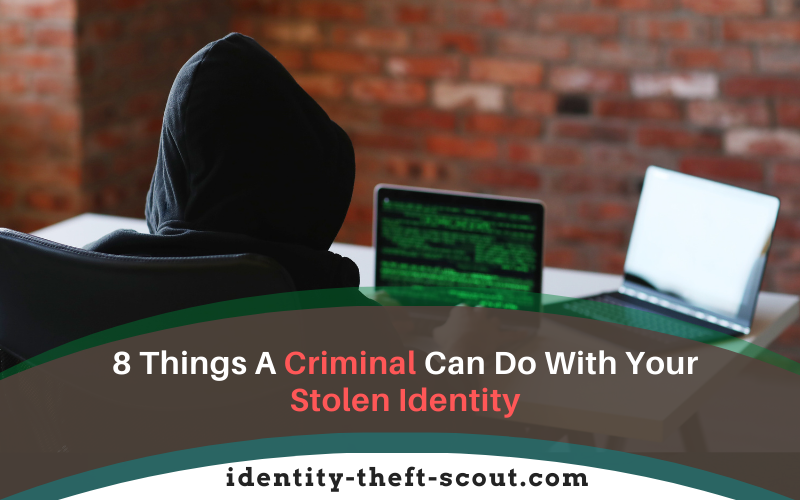
Identity theft is a serious crime, but it is also one that is not often taken as seriously as it should be. A stolen identity is valuable, and you need to protect your identity online. The thought of identity hijacking might seem farfetched to many people who do not imagine what their details could be worth to a criminal – but for everyone with personal information online with their name, it is a real and every-day danger.
The US Federal Trade Commission (FTC) warned of increasing identity theft in 2021 amidst the COVID-19 pandemic. With social distancing and lockdown, personal information became more likely to travel online, and criminals seem to have seen a gap to increase their efforts.
1. Unclaimed Unemployment Benefits

Unclaimed benefits make up a large chunk of identity theft exploits every year, with thousands of dollars worth lying in the electronic money pool until a user’s information allows them to claim it.
All it takes for a scammer to gain illegal access is a convincing impersonation of an existing identity on the system. It is a spin on identity theft known to happen internationally, and every year.
Unemployment benefits make for an especially popular target.
In May 2021, potentially eligible residents of Texas were warned to check any outstanding payments due to a serious spike in fraudulent unemployment benefit claims.
Read More- https://news.yahoo.com/beware-unemployment-benefit-identity-theft-191100856.html
2. Illegal Credit Or Loans

With a stolen identity, comes the opportunity for an impersonated credit score. Credit or loan applications using false identities is one way in which a scammer might exploit illegally gained information.
Synthetic identity fraud uses an entirely false (or composite) identity, but there are many instances where criminals relied on an existing person.
In 2020, Coast Reporter shared news of a British Columbia resident who only discovered their identity had been stolen when they started to receive calls from debt collectors asking for money.
The story is not unique but happens on an international scale far too often – and could happen to you.
3. Fraudulent Tax Claims

Tax returns could be worth thousands and lie unclaimed in the pool for specific users just the same way as unemployment benefits might.
Identity theft might be applied to file or claim tax returns to the stolen name. It is another identity crime that often goes unnoticed when it occurs but might see the victim tipped off later when they hear from a financial authority after it has already been committed.
In a crime reported in Seattle, an identity criminal managed to claim $34, 000 worth of tax returns illegally. According to official news, they received a sentence of 5 years imprisonment.
Read More- https://www.justice.gov/usao-wdwa/pr/prolific-and-relentless-identity-thief-sentenced-5-years-prison
4. Expensive Shopping Sprees

The use of stolen identities is often used to go on elaborate, expensive shopping sprees – and even made an appearance in the Jason Bateman-starring film, Identity Thief (2013). In fact, it was most of the plot.
With a stolen identity, criminals might have access to credit card details and other financial information that can be exploited to their advantage.
What could someone buy with your information?
Anything they like.
In one case from Detroit, Fox News reported the arrest of two individuals who used false identities to rack up a range of odd costs that included a Dodge Charger.
Often, identity theft is not cheap.
5. Illicit Employment

Identity theft is not always an overnight crime, but extreme cases might take months or years to be discovered by the authorities or victims.
In this case from Sedalia, Missouri, a criminal managed to hide under false identities for a total of nine years. The identities had been used for several longer-term goals according to news reports, including “for employment at a local business.”
Read More: https://krcgtv.com/news/local/woman-arrested-for-forgery-and-identity-theft
6. False Leases

A false identity could be used to do almost anything that an authentic identity might, but with malicious intentions by the perpetrator – and legal implications for the true person.
In a story from Allentown, Pennsylvania, a perpetrator used false identities to sign several lease agreements in the area. According to local news sources, at least four apartments had been leased, with one lasting at least six months.
7. Catfishing Profiles

The common catfishing-scam involves a scammer luring their victim with the idea of friendship, romance, or love. Connections are then exploited for personal gain, often resulting in further personal information (or money) siphoned away from the victim over time.
While the idea of a catfish criminal is severe enough to most, it is where these perpetrators source their profiles that is of the most concern to anyone who has an identity to protect.
Scammers might use a composite identity for the catfishing-scam, but more than enough reports warn of criminals harvesting information from real profiles.
Names, personal details, and every photo uploaded in public could be a potential target for a criminal with blanks to fill in. Search your images and information often and guarantee that it is not being used for nefarious purposes anywhere on the internet.
Read More- https://www.bbc.com/news/av/uk-england-46795876
Adult Content Scams

Any information that a user might choose to share with another via online platforms could become vulnerable – and unfortunately, useful to an identity thief. Entire profiles are vulnerable, but a scammer might also be looking for much more specific details to exploit.
The BBC reported on the adult image trade, which often happens on peer-to-peer networks via the internet. Users are cautioned to keep a tighter handle on personal content of an adult nature: as it turns out, these images are a potential goldmine for criminals,
Images might be traded, shared, sold, or used to set up entire online identities to fleece further users.
Read More- https://www.bbc.co.uk/bbcthree/article/d497a8d4-a0b4-4cf7-8b29-662a5635e71e
This is a guest post contribution from Alex J Coyne
Editor’s Note
Alex writes excellent cybersecurity guest post articles for us and it looking for paid work in that field. If you are looking for a top cybersecurity writer send us an email at john@identity-theft-scout.com and we will put you in touch with him.


